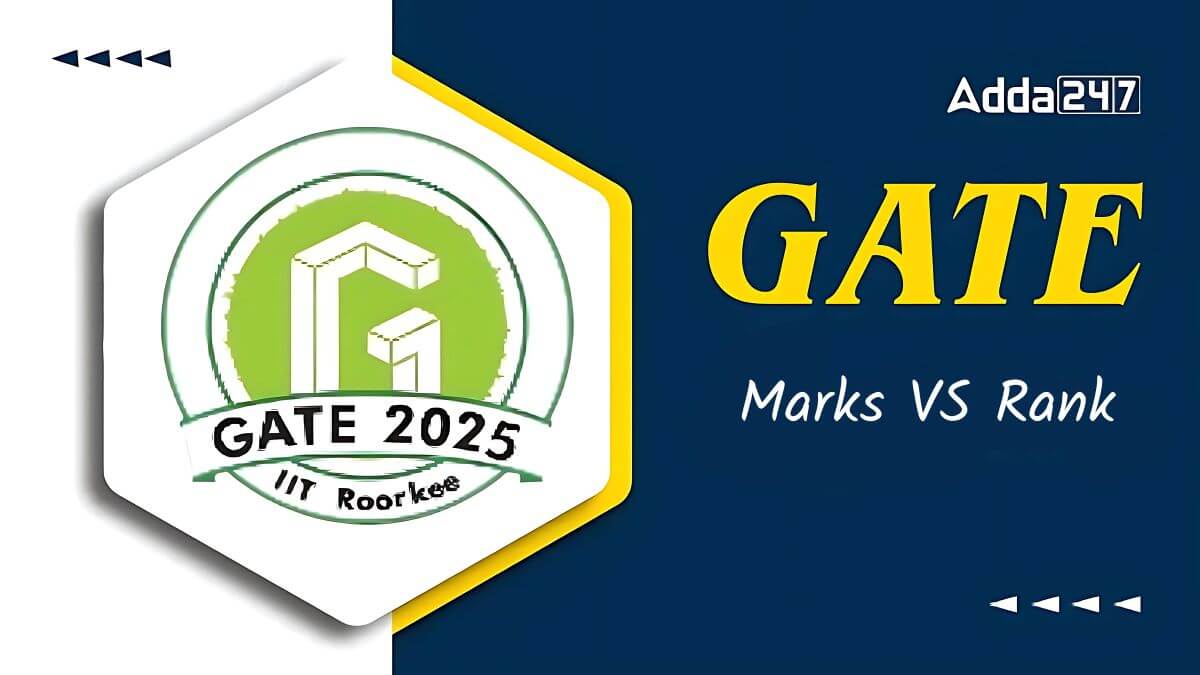Table of Contents
Candidates preparing for the GATE 2026 exam must have a clear understanding of the GATE Marks vs Rank analysis. This crucial information helps aspirants estimate the minimum marks required to secure a high rank in their respective engineering disciplines. The Graduate Aptitude Test in Engineering (GATE) is a national-level exam that evaluates a candidate’s comprehensive understanding of undergraduate-level engineering and science subjects.
By analyzing the GATE Marks vs Rank trends from previous years, candidates can set realistic targets, optimize their preparation strategy, and plan their next steps—whether it’s pursuing higher studies or applying for PSU recruitment. Read on to understand how GATE marks translate into ranks and why this analysis is vital for your success.
GATE Marks vs Rank
The marks scored in the GATE 2026 exam play a critical role in determining a candidate’s All India Rank (AIR) as well as their subject-specific rank. Understanding how GATE marks correlate with rank is essential for aspirants to evaluate their performance accurately and gauge their chances of admission into top IITs, NITs, or other prestigious institutes. It also helps candidates assess their potential for securing jobs in leading Public Sector Undertakings (PSUs) that recruit through GATE scores.
GATE 2026 Marking Scheme
Understanding the GATE 2026 marking scheme is crucial for every aspirant aiming to score well in the exam. A clear grasp of the marking pattern helps candidates accurately calculate their expected scores, evaluate their performance, and estimate their All India Rank (AIR) in their respective papers. Additionally, knowing the negative marking criteria and the distribution of marks across different question types can enhance time management and reduce errors during the exam.
| GATE 2026 Marking Scheme | |
| Question Type | Marking Scheme |
| MCQs with 1 Mark | 1/3 of the deduction on the wrong answer |
| MCQs with 2 Marks | 2/3 of deduction on wrong answers |
| NAT Questions | No negative marking |
GATE Marks 2025
The GATE exam has a total of 65 questions, worth 100 marks altogether. These marks show how well a candidate has performed in the exam. The higher the marks out of 100, the better the candidate’s performance. The GATE Score is an important part of the GATE exam. It is calculated using a procedure known as normalization, which considers the varying difficulty levels of different papers. The GATE examination includes 30 papers of different levels of difficulty. A systematic approach known as normalization is used to make the evaluation fair and comparable. The GATE Score is calculated for every applicant on a scale of 0 to 1000, implying the total marks.
What is the GATE Rank?
The GATE Rank plays a key role in the GATE exam results. It is based on the marks you score in the final GATE exam. Once your GATE marks are finalized, you are assigned a rank. This rank is called the All India Rank (AIR). The AIR shows how well you performed compared to other candidates who appeared for the GATE exam. Your GATE AIR can help you apply for postgraduate programs in various institutes. A higher rank increases your chances of getting admission into top institutes like IITs, NITs, or other prestigious universities. That’s why it’s important to aim for a good GATE rank. It can open up great opportunities for your future in engineering and science.
GATE Marks Vs Rank (Previous Years)
The GATE Marks vs Rank chart provides valuable insights into how a candidate’s rank varies with their score. By analyzing previous year data, candidates can better understand the competition and set realistic score targets.
GATE 2025 Marks vs Rank
The table below presents the GATE Marks vs Rank details based on the GATE 2025 exam, giving aspirants a clear reference to plan their GATE 2026 preparation effectively.
| GATE 2025 Marks vs Rank | |
| Electrical Engineering | |
| Marks | Rank |
| 80-90 | 1-10 |
| 70-80 | 11-100 |
| 55-69 | 101-750 |
| 40-55 | 751-2000 |
| 27-39 | 2001 onwards |
| Mechanical Engineering | |
| Marks | Rank |
| 90+ | 1-10 |
| 80-90 | 10-300 |
| 70-80 | 300-1000 |
| 55-69 | 1001-3000 |
| 40-55 | 3000 onwards |
| Civil Engineering | |
| 100 – 80 | 1 – 30 |
| 80 – 70 | 30 – 200 |
| 70 – 60 | 200 – 1000 |
| 60 – 50 | 1000 – 3000 |
| 50 – 40 | 3000 – 7000 |
| 40 – 30 | 7000 and Below |
GATE 2024 Marks vs Rank
The table below presents the GATE Marks vs Rank details based on the GATE 2024 exam, giving aspirants a clear reference to plan their GATE 2026 preparation effectively.
| GATE 2024 Marks Vs Rank | |
| Rank | GATE Marks |
| 1-10 | 85-90 |
| 10-50 | 82-87 |
| 50-100 | 80-85 |
| 100-200 | 78-83 |
| 200-500 | 76-81 |
| 500-1000 | 74-79 |
| 1000-2000 | 72-77 |
| 2000-5000 | 70-75 |
| 5000-10000 | 60-65 |
GATE Marks vs Rank 2023 Civil Engineering
In GATE 2023 for Civil Engineering, candidates who scored above 90 marks were among the top 10 rank holders. Check the details below to understand the GATE Marks vs. Rank for Civil Engineering.
| GATE Marks Vs Rank for Civil 2023 Branch | |
| GATE Rank | GATE Marks |
| 1-10 | 90+ |
| 10-50 | 85-90 |
| 50-100 | 78-85 |
| 100-200 | 74-78 |
| 200-500 | 70-74 |
| 500-1000 | 64-70 |
| 1000-2000 | 57-64 |
| 2000-5000 | 50-57 |
| 5000-10000 | 40-50 |
GATE Marks vs Rank 2023 Mechanical Engineering
In GATE 2023 for Mechanical Engineering, candidates who scored above 90 marks were among the top 10 rank holders. Check the details below to understand the GATE Marks vs. Rank for Mechanical Engineering.
| GATE Marks Vs Rank for Mechanical 2023 Branch | |
| GATE Rank | GATE Marks |
| 1-10 | 92+ |
| 10-50 | 87-92 |
| 50-100 | 85-87 |
| 100-200 | 82-85 |
| 200-500 | 79-82 |
| 500-1000 | 75-79 |
| 1000-2000 | 71-75 |
| 2000-5000 | 63-71 |
| 5000-10000 | 51-63 |
GATE Marks vs Rank 2023 Electrical Engineering
In GATE 2023 for Electrical Engineering, candidates who scored above 90 marks were among the top 10 rank holders. Check the details below to understand the GATE Marks vs. Rank for Electrical Engineering.
| GATE Marks Vs Rank for Electrical 2023 Branch | |
| GATE Rank | GATE Marks |
| 1-10 | 91 and above |
| 10-50 | 87-90 |
| 50-100 | 84-86 |
| 100-200 | 81-83 |
| 200-500 | 77-80 |
| 500-1000 | 72-76 |
| 1000-2000 | 66-71 |
| 2000-5000 | 57-65 |
| 5000-10000 | 46-56 |
GATE Marks vs Rank 2023 Electronics Engineering
In GATE 2023 for Electronics Engineering, candidates who scored above 90 marks were among the top 10 rank holders. Check the details below to understand the GATE Marks vs. Rank for Electronics Engineering.
| GATE Marks Vs Rank for Electronics 2023 Branch | |
| GATE Rank | GATE Marks |
| 1-10 | 80 and above |
| 10-50 | 75-79 |
| 50-100 | 72-74 |
| 100-200 | 68-71 |
| 200-500 | 62-67 |
| 500-1000 | 56-61 |
| 1000-2000 | 50-55 |
| 2000-5000 | 40-49 |
| 5000-10000 | 32-39 |
GATE Marks vs Rank 2023 Computer Science Engineering
For the GATE 2023 Computer Science Engineering (CSE) exam, candidates who scored more than 80 marks secured a spot in the top 10 ranks. Check out the detailed marks vs. rank information for the CSE paper in the table below.
| GATE Marks Vs Rank for Computer Science 2023 Branch | |
| GATE Rank | GATE Marks |
| 1-10 | 80+ |
| 10-50 | 75-80 |
| 50-100 | 72-75 |
| 100-200 | 68-72 |
| 200-500 | 62-68 |
| 500-1000 | 56-62 |
| 1000-2000 | 50-56 |
| 2000-5000 | 40-50 |
| 5000-10000 | 32-40 |
What is a Good Rank in GATE?
A common question that many GATE aspirants have is, ‘What is considered a good GATE rank?’ The answer depends on the institute you’re aiming for. In general, a GATE rank below 200 can help you secure a job in PSUs (Public Sector Undertakings). If your rank is below 1,000, you may be eligible for postgraduate programs at top institutes like IITs, NITs, and other reputed colleges. Take a look at the table below to see the comparison of GATE marks vs rank of toppers in different branches from previous exams.
| GATE Rank | GATE Marks |
| For Civil Engineering | |
| 1 | 87.72 |
| 3 | 83.78 |
| 5 | 83.13 |
| 7 | 82.15 |
| 9 | 82.08 |
| 10 | 81.73 |
| For Mechanical Engineering | |
| 1 | 94.75 |
| 2 | 94.65 |
| 3 | 93.39 |
| 4 | 91.69 |
| 5 | 91.38 |
| 7 | 91.01 |
| 10 | 89.31 |
| For Electrical Engineering | |
| 1 | 97.33 |
| 2 | 97.00 |
| 4 | 96.33 |
| 5 | 95.67 |
| 7 | 95.00 |
| 10 | 94.33 |
| For Computer Science Engineering | |
| 1 | 88.67 |
| 2 | 88.33 |
| 3 | 87.00 |
| 9 | 84.67 |
| For Electronics and Communication Engineering | |
| 1 | 89.00 |
| 3 | 82.67 |
| 4 | 82.00 |
| 6 | 81.00 |
| 7 | 80.33 |
| 9 | 80.00 |
GATE Rank Vs Marks of Toppers in 2023
IIT Kanpur has released the GATE Marks vs Rank list of toppers for 2023. Students preparing for the GATE 2025 exam can refer to the table below to plan their study schedule and manage their time better.
| Sections | Name | Marks | Rank |
| Aerospace Engineering | JOSHI YASH KISHORBHAI | 73 | 988 |
| Agricultural Engineering | ANSHIKA RAI | 49 | 1000 |
| Architecture and Planning | SHREYA BHARDWAJ | 75.67 | 1000 |
| Biomedical Engineering | THANDAVA SESHA TALPA SAI SUNKARA | 60 | 1000 |
| Biotechnology | AISHWARYA K | 79.67 | 1000 |
| Chemical Engineering | ROHIT BHAGAT KALWAR | 92.67 | 1000 |
| Chemistry | ATANU DAS | 72 | 981 |
| Civil Engineering | SUBAN KUMAR MISHRA | 83.11 | 1000 |
| Computer Science and Information Technology | JAYADEEP SUDHAKAR MORE | 93.67 | 1000 |
| Ecology and Evolution | KARTHIK THRIKKADEERI | 84.33 | 1000 |
| Electrical Engineering | BHANWAR SINGH CHOUDHARY | 66 | 1000 |
| Electronics and Communication Engineering | SIDDHARTH SABHARWAL | 90 | 1000 |
| Engineering Sciences: Solid Mechanics & Thermodynamics | ANSHUMAN | 83.67 | 952 |
| Environmental Science and Engineering | DEVENDRA PATIL & MANISH KUMAR BANSAL | 64.33 (Both) | 953 (Both) |
| Geology and Geophysics: Geophysics | SHUBHAM BANIK | 85.67 | 1000 |
| Geology and Geophysics: Geology | MANISH SINGH | 74 | 1000 |
| Geomatics Engineering | SAURAV KUMAR | 66 | 1000 |
| Humanities and Social Sciences: Economics | V GAURAV | 83.33 | 989 |
| Humanities and Social Sciences: Psychology | DEEPTI DILIP MOAR | 84 | 1000 |
| Humanities and Social Sciences: Linguistics | KEERTHANA NAIR | 74.67 | 1000 |
| Humanities and Social Sciences: Philosophy | SREERAM K N | 72.67 | 1000 |
| Humanities and Social Sciences: Sociology | TEJASVI KAMBOJ | 73 | 943 |
| Humanities and Social Sciences: English | SAYANTAN PAHARI | 84.33 | 1000 |
| Instrumentation Engineering | AKASH SRIVASTAVA | 78.33 | 968 |
| Life Sciences: Biochemistry & Botany | ADVAITA SHARMA | 73.33 | 1000 |
| Mathematics | SUVENDU KAR | 50.33 | 941 |
| Mechanical Engineering | ARYAN CHOUDHARY | 90.67 | 1000 |
| Metallurgical Engineering | ASHUTOSH KUMAR YADAV | 85.67 | 973 |
| Mining Engineering | UDIT JAISWAL | 63.33 | 973 |
| Naval Architecture and Marine Engineering | SHIVAM RANJAN | 60 | 1000 |
| Petroleum Engineering | MAHAMMADTAUKIR ALAUDDINBHAI KARIGAR | 74.67 | 963 |
| Physics | ARUNENDRA KUMAR VERMA | 75 | 1000 |
| Production and Industrial Engineering | SH GOWTHAM GUDIMELLA | 87.33 | 938 |
| Statistics | NIKHILESH RAJARAMAN | 73.67 | 1000 |
| Textile Engineering and Fibre Science | AMIT KUMAR PANDEY | 66 | 1000 |




 What is the Life After Clearing SSC JE E...
What is the Life After Clearing SSC JE E...
 Top 8 Engineering Colleges in Pune 2025,...
Top 8 Engineering Colleges in Pune 2025,...
 Top 10 Career Opportunities After GATE E...
Top 10 Career Opportunities After GATE E...









